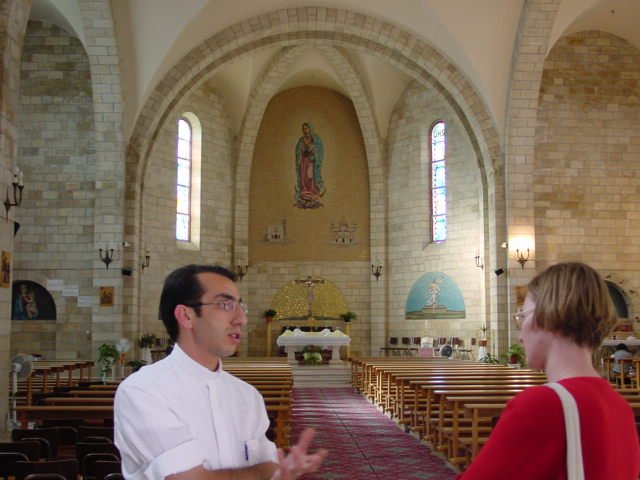July 10, 2001
After class today, the Public Relations chair at the University gave an impromptu talk on students' questions and whatever came to mind. Albert Alghazarian is an Armenian Palestinian Christian Jerusalemite, and he is passionate about each of those facets of his identity. As for history, he talked about Birzeit's "illegal cells of education" (so-called by the Israeli government) as it organized classes in professors' homes between 1988 and 1992 when the University was closed by Israeli military order.
He also talked about operations at the University during this Intifada and how frustrated he is with his people's "ability to adapt." A case in point is the roadblocks put up at the edge of Birzeit, cutting it off from Ramallah. Palestinians, he said, when turned back from a checkpoint will go around. But the next day, they won't even try that checkpoint, they'll just go around. Pretty soon, everyone's going around rather than putting pressure on the checkpoint to be open (our ride from Zababdeh yesterday immediately came to mind).
Elizabeth in conversation with Fr. Iyad Twal, parish priest in Birzeit, Palestine.
Later today, we got a chance to meet with the priest of the Latin Church (called "Our Queen of Peace"), Abuna Iyad Twal. Abuna Iyad has been in Birzeit for three years, having been born and raised in Jordan. We thanked him for housing us, shared greetings from other Presbyterians in relationship with his parish (First Presbyterian Church of Houston and National Presbyterian Church in Washington, D.C.), and talked to him about matters of all concerns, including the impending leadership change in Zababdeh. He is clearly quite an energetic and intelligent man. He also has a great sense of humor and strikes us as quite a wonderful leader for this community. He took us to see the church, which was originally built with financial help and workers from Mexico. Thus, its center mosaic (and its original name) were La Guadalupana , the famous Mexican image of Mary; this, and the image of the cathedral in Mexico City, were not things one would expect in the middle of Palestine!
The Tel Aviv skyline, barely visible against the setting sun.
We could've spent the rest of the day with Abuna Iyad, but our studies demanded us. We returned home around sunset, able to see the distant skyline of Tel Aviv, rose-silhouetted against the sunlit Mediterranean. It provided a perfect backdrop for watermelon with the neighbors and hide-n-go-seek with their kids.


